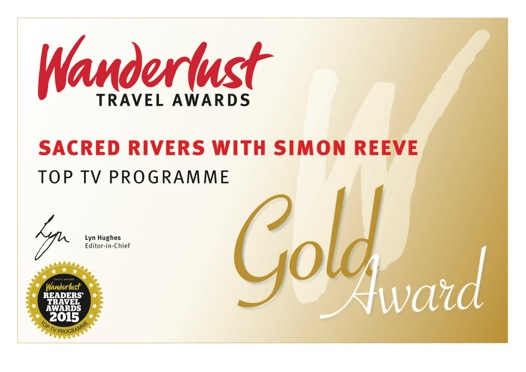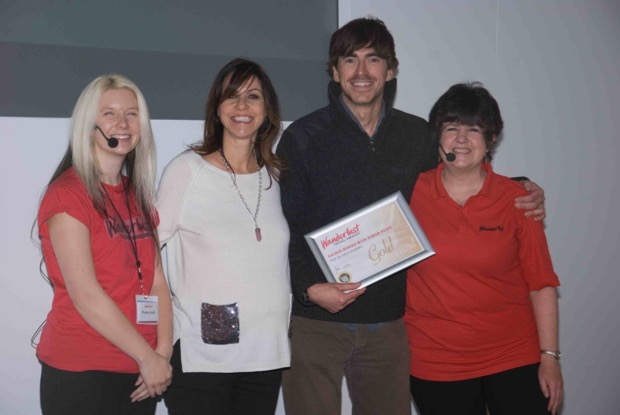
Sacred Rivers with Simon Reeve
Belief, history, ecology and travelogue combine as
Simon discovers stories from parts of the world that
cannot be grasped without understanding the vast
influence of their rivers. This series
demonstrates that the world’s most sacred rivers
don’t just flow through countries - they define
them.
Across the world, water has always had a sacred meaning
but in these rivers we see it on a magisterial
scale. In his potent, familiar mix of hands-on
experience, revelation and adventure, Simon uncovers
the powerful beliefs and practices that make these vast
waterways unite and divide some of the most
extraordinary countries on earth.
Adventurer
Simon Reeve travels from source to sea along the
world’s longest river, the Nile. Travelling
through three very different countries Simon sets out
to try and answer the most important question facing
this mighty river today. Who does its sacred waters
belong to?
Simon’s journey begins in the highlands of
Ethiopia, at the holiest site on the river, the source
of the Blue Nile. Meeting Christian pilgrims who have
come to the source to be healed, Simon is moved by the
strength of their beliefs. Over 80% of the Nile’s
flow originates in Ethiopia but until now this poor
country hasn't fully tapped into the river’s huge
potential to irrigate crops and generate electricity.
Following the river north Simon heads to a remote
location where Ethiopia is building one of the largest
and most controversial engineering projects in Africa.
When complete the Grand Renaissance Dam will create a
vast inland sea and generate massive amounts of
hydroelectric power, tripling Ethiopia’s current
output. But when there are over 85 million Egyptians
downstream depending entirely on the river for their
survival, this dam is already fiercely disputed.
From Ethiopia, Simon heads north along the river to
Sudan. Here too people are putting their faith in the
Nile to secure their future. Blessed with the longest
stretch of the river than any other country Simon
visits an extraordinary mega farm where millions of
gallons of water is pumped from the Nile each day
turning the desert green.
In Sudan Simon finds a country rich in history and
culture. After witnessing the Islamic sunset ritual of
the Whirling Dervishes in Khartoum, he visits the
ancient sites of one of Africa's earliest civilization.
The Nubian kingdom of Kush rose up alongside the Nile
thousands of years ago rivaling its Egyptian neighbours
down river. Simon visits the breathtaking pyramids of
their kings and queens before climbing a spectacular
300 foot rock once believed to be the mount of
creation.
Leaving Sudan, Simon arrives in Egypt where he visits a
surviving Nubian village. Here locals carve out a
living in Egypt’s flagging tourist industry by
keeping Nile crocodiles as pets in their homes. Nearby
Simon is awe struck by one of the wonders of the
ancient world, the Temple of Isis at Philae.
On the final leg of his journey Simon takes the train
to Cairo. He visits the stunning but now largely
forgotten Nilometer at the centre of the city that once
measured the crucial annual flood on which the economy
of Egypt depended. The Nile is still as key to the
country's fortune as ever and in the Nile Delta where
the famous Egyptian cotton is grown Simon finds farmers
struggling to make a living. They believe the waters of
the Nile are their god given right and don't want
countries upstream taking a greater share. As Simon
finally arrives in the ancient Mediterranean port of
Alexandria he reflects that in the future the Nile.
Guardian – Pick of the Day: “It's great. Simon Reeve is that nice wide-mouthed man who goes to places the Foreign Office advises against going to…He's smiley, cheerful and tells a good story. I'm not a massive fan of the travelogue - especially the celebrity one. I honestly don't give a toss how moved such-and-such an actor is by a view or the poverty in wherever. But Reeve isn't a celebrity, and this isn't just travelogue. It's all those other things I mentioned, which flow together, converge, romantically sometimes, into one story. A good one too, well told - he's good at making things that have the potential to be boring not boring. Plus he's an affable travelling companion. I'm already looking forward to floating down the Ganges with him next Sunday.”
Sunday Times: “Pick of the Day…By placing the series right after the presenter-less Wonders of the Monsoon, BBC2 offers an opportunity to consider the need for a frontman; but it is a test Reeve passes with flying colours. Whereas the voiced-over nature series is shapeless and confusing, Sacred Rivers is given narrative coherence and memorability by his journey and reflections.”
Daily Mail: “Highlight of the Week…4 stars…eye-opening…the engaging and endlessly curious Simon Reeve follows the mighty Nile…a typically illuminating and enjoyable series…a depth of knowledge that makes you want to visit these places yourself.”
Daily Express - Critic’s Choice: “A travelogue that flows…Another richly intriguing slice of geopolitical travelogue from the thinking man’s Michael Palin.”
Financial Times: “Pick of the Week…Reeve’s enthusiasms are genuine, his dismay spontaneous. The journey is fabulous but the increasingly important question of who the Nile actually belongs to is always present. As a travelogue and potted history of the watery lifeline linking countries that have hosted the world’s greatest religions, the film is riveting. Ethiopia was the first Christian kingdom anywhere. Egypt, a medieval Christian state, used ancient temples as bases for their missionaries. Like all good travel films, this leaves us marvelling at the past, enjoying the present and asking questions about the future.”
The Observer – Pick of the Week: “An expert television journalist, [Reeve] manages to combine history, mystery, belief and sheer wonder as he tells the story of the river known to many as the "life-giver". However, he also takes care to explain that with populations along its banks rising fast, Nile countries are demanding an ever greater share of the waters, threatening the stability of the entire region. No rosy-tinted pilgrimage, this. Recommended.”





